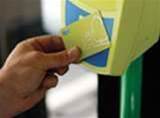The Victorian Government is expected to be slugged an additional $350 million to cover revenue guarantees given to private transport operators when the state's myki smart card ticketing system was introduced.

The huge fee is the result of an uneven spread of financial risk that disincentivised private operators from cracking down on fare evasion during myki's introduction, and a lack of critical oversight by the state's Department of Transport, the state's auditor-general Des Pearson found. (pdf)
The $350 million-plus shortfall in fare revenue is not only the result of fare evasion but of lower than expected patronage figures since myki was introduced.
Pearson's audit revealed a sharp rise in fare evasion after the state's myki smart card ticketing system went live.
Fare evasion across metropolitan trains, tram and bus services was at an all-time low in the first half of 2008, costing the state and transport operators $17.3 million.
It has been rising ever since, but the sharpest increase came in an 18-month period between January 2010 and June 2011, when losses soared by $18.7 million.
"This period immediately followed the start of new train and tram contracts in November 2009 and the introduction of myki in December 2009," the state's auditor-general found.
Between December 2009 and October 2010, an "educational" period was enacted where enforcement officers were to focus on getting commuters to use myki correctly, rather than dole out fines for incorrect usage.
During the transition, officers were to continue to fine evaders who used the older Metcard magstripe tickets.
However, the auditor-general noted that leniency "in dealing with people using myki" in the transition period was somehow also extended to Metcard users as well.
In addition, between the start of myki and December 2013, transport operators are guaranteed "their forecasts of fare revenue" - meaning the state is responsible for paying any shortfall between the forecast amount and what is actually collected.
The arrangement effectively means operators receive the same revenue whether they enforce fares or not.
"It is clear that the tram and train operators took a lenient approach to both myki and Metcard users," the auditor-general noted.
"Although the written instructions were clear, the operators interpreted written and verbal advice, and the absence of risk sharing, in a way that meant Metcard enforcement was relaxed.
"... Particularly the verbal instructions to operators in the face of transitioning to myki were at best unclear and the implications for fare evasion were not appropriately considered."
The auditor-general was particularly unhappy that the Department of Transport did not increase its oversight of fare evasion during the myki transition period, noting that lack of oversight would now cost the state millions.
Though fare evasion was trending downwards again, the auditor called on Public Transport Victoria - which assumed revenue protection responsibilities from the department in April 2012 - to come up with a plan to "significantly reduce fare evasion over the next three to five years".


_(28).jpg&h=140&w=231&c=1&s=0)

_(33).jpg&h=140&w=231&c=1&s=0)
_(20).jpg&h=140&w=231&c=1&s=0)





 iTnews Benchmark Awards 2026
iTnews Benchmark Awards 2026
 iTnews Executive Retreat - Security Leaders Edition
iTnews Executive Retreat - Security Leaders Edition
 iTnews Cloud Covered Breakfast Summit
iTnews Cloud Covered Breakfast Summit
 The 2026 iAwards
The 2026 iAwards












_(1).jpg&h=140&w=231&c=1&s=0)



